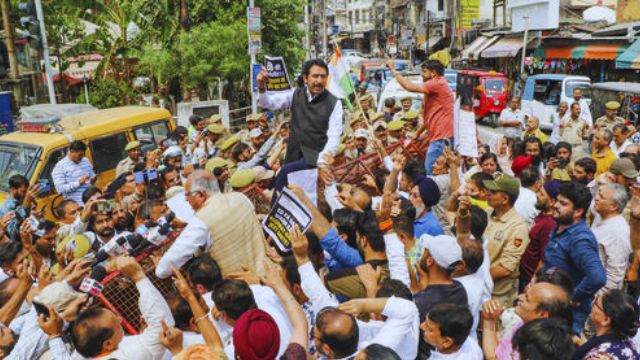Buckle up, folks—India’s political arena is heating up, and the National Herald case is the latest flashpoint. The Indian National Congress is rallying its troops for nationwide protests after the Enforcement Directorate (ED) dropped a bombshell chargesheet on April 9, 2025, naming heavyweights Sonia Gandhi, Rahul Gandhi, and five others in a ₹5,000-crore money laundering scandal. The Congress is crying foul, calling it a BJP-orchestrated vendetta, while the ruling party insists it’s a long-overdue reckoning. So, what’s the deal with this case, and why is it sending shockwaves through India’s political landscape? Let’s dive in.
What Is the National Herald Case? A Quick Breakdown
If you’re scratching your head wondering what the National Herald is, here’s the lowdown. The National Herald was a newspaper founded in 1938 by Jawaharlal Nehru, a cornerstone of India’s freedom struggle. Its publisher, Associated Journals Limited (AJL), owned valuable real estate across the country. Fast forward to 2010, and the ED alleges that Young Indian Private Limited (YI)—a company where Sonia and Rahul Gandhi hold a 76% stake—sneakily acquired AJL’s properties, worth over ₹5,000 crore, for a measly ₹50 lakh.
The ED’s chargesheet claims this was no ordinary deal. They accuse the Gandhis of cheating AJL shareholders and Congress donors by wiping out a ₹90.2-crore loan owed to the party and collecting ₹38.41 crore in “bogus advance rent” without proper rental agreements. The case kicked off in 2012 after BJP leader Subramanian Swamy filed a complaint, and it’s been simmering ever since, with the ED now turning up the heat.
Congress Hits Back: “This Is Political Revenge”
The Congress isn’t taking this lying down. On April 15, the party called an emergency meeting of its general secretaries and state in-charges to plan a wave of protests, particularly outside ED offices. From Mumbai to Delhi, Congress workers have hit the streets, with leaders like Varsha Gaikwad and Sachin Pilot leading the charge. The message? This chargesheet is a “state-sponsored crime” designed to crush the opposition.
Congress general secretary Jairam Ramesh didn’t mince words on X: “Seizing National Herald assets is a shameless vendetta by the PM and HM. Filing chargesheets against Sonia and Rahul Gandhi is a desperate attempt to silence us.” The party argues there’s no evidence of shady transactions or asset transfers, pointing out that the case began in 2012 under their own UPA government. “This is a distraction from real issues like inflation and unemployment,” Pilot told reporters, vowing to fight “legally and politically.”
BJP Fires Back: “The Gandhis Can’t Escape Accountability”
The BJP, meanwhile, is doubling down. Senior leader Ravi Shankar Prasad called the National Herald the “Congress’s ATM,” accusing the Gandhis of exploiting a historic newspaper for personal gain. “If they’re innocent, why the panic? Let the courts decide,” Prasad said at a press conference. BJP state president VD Sharma added fuel to the fire, noting that the case predates the Modi government, with Delhi High Court hearings starting in 2013. “The Congress is playing the victim to dodge accountability,” Sharma said.
The BJP’s narrative is clear: the ED is doing its job, and the Gandhis aren’t above the law. They’ve urged the Congress to face the allegations +1000re in court rather than “staging drama” on the streets.
Why This Matters: A Political Powder Keg
This isn’t just about a newspaper or some dusty real estate. The National Herald case is a political powder keg that could reshape India’s opposition landscape. For the Congress, it’s a chance to rally supporters and paint the BJP as a bully using agencies like the ED to stifle dissent. But if the charges stick, it could cripple the party’s credibility and weaken its fight against the BJP juggernaut.
Political analyst Arati Jerath sees a bigger game at play. “The BJP knows the economy’s shaky, and public frustration is growing. By reviving this case, they’re keeping the Congress on the defensive, diverting attention from their own challenges,” she says. On the flip side, the Congress’s protests could backfire if voters see them as protecting the Gandhis instead of addressing everyday concerns like rising prices.
What’s Next for the National Herald Case?
The ED’s chargesheet sets the stage for a legal slugfest. Sonia and Rahul Gandhi could face criminal charges, with the case now headed to court. The Congress is banking on the judiciary to clear their names, while the BJP is betting on public opinion to keep the pressure on. Protests are expected to intensify, with Delhi police already detaining Congress workers outside the AICC headquarters.
One thing’s for sure: this saga is far from over. As the courts weigh in and protests light up the streets, the National Herald case will keep India’s political temperature sky-high. Will the Congress emerge stronger, or will the BJP’s gambit pay off? Grab your popcorn—this is one political thriller you won’t want to miss.
Join the Conversation
What do you think about the National Herald case? Is it a legitimate crackdown on corruption, or a political witch hunt? Drop your thoughts in the comments below, and don’t forget to share this post to keep the debate going. For more updates on India’s political rollercoaster, subscribe to The Political Pulse and follow us on X!



